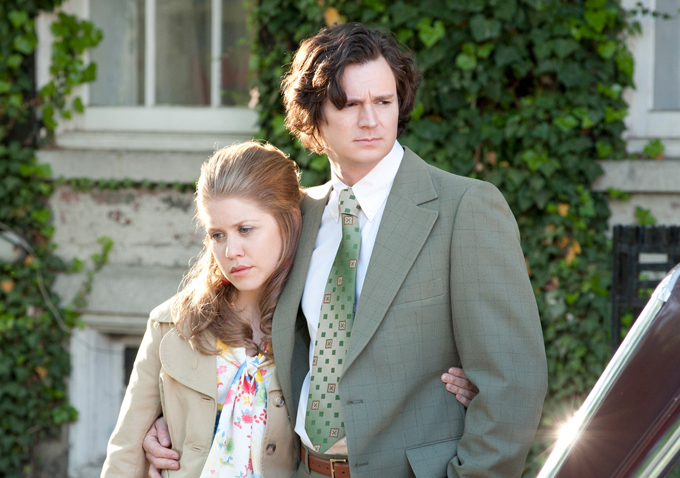
Capturing the magnetic, larger than life personality of Muhammad Ali has been something only a few actors have tried over the years, including Will Smith, Darius McCrary and Terrence Howard. And while the boxing legend and sports world superstar can be imitated, he simply can’t be duplicated. So call it a savvy move on the part of screenwriter Shawn Slovo and director Stephen Frears to avoid that issue altogether in “Muhammad Ali’s Greatest Fight,” which defers to archival footage to present the titular subject in the dramatized story of his fight against his conviction of avoiding the Vietnam War draft, a crime punishable by up to five years in prison. Unfortunately, that archival material is also the most dramatically potent in a film that presents the story respectfully, if not particularly compellingly.

Benjamin Walker leads the film as Kevin Connolly, a new clerk in the office of Supreme Court veteran Justice Harlan (Christopher Plummer). The young man is a bit of outsider from his fellow colleagues, a graduate of Missouri State instead of an Ivy League school, and a man whose personal political convictions tend to lean a bit more to the left. But he’s eager and dogged to please, looking to earn the respect of Harlan and the fellow clerks who have long learned to support their bosses and keep their own thoughts out of the process. This is embodied in Covert Becker (Pablo Schreiber), another clerk in Harlan’s office, who would prefer to play politics than get involved with them. But for the most part, the characters are mere sounding boards for the script that gives up on the notion of dramatic tension to instead attempt to investigate a discourse on ideals.
And in theory, this is a smart, potentially intellectually involving approach, but the film never allows for a considered view of the reasons to uphold the conviction instead of reverse it. Frank Langella‘s Chief Justice Warren Burger is set up as the film’s villain—all glowering, and veiled threats—a scheming judge eager to take credit for the decisions handed down by the Supreme Court, trying to ensure whenever possible unanimous decisions that show no one opposes his viewpoints. He troublingly has regular phone calls with President Richard Nixon, and his views on African-Americans are not quite racist, but certainly dated. Burger is so one-dimensional that the audience is never left a chance at moral ambiguity to decide for themselves how they might consider a case that weighs the letter of the law against the duty for one’s country. Rather, as the film heads into its third act, it mostly focuses on Connolly finding a legal way to support Ali’s claims of objecting to the draft due to religious reasons.

Running just a touch over 90 minutes, not a lot particularly happens in “Muhammed Ali’s Greatest Fight.” As the outcome of the case is known, and the movie makes it clear from the outset where the dramatic payoff will lie, there is little in the way of real conflict in the movie. But thankfully, the performances are enough to least keep things mildly involving. Walker is very good as Connolly, nicely conveying the character’s enthusiasm and personal conflict, when Harlan initially decides to uphold Ali’s conviction. And his scenes with the equally charming Plummer (who veers a bit too close to “kindly grandpa” territory) are among the film’s best. Aside from Langella’s one-sided “baddie,” the rest of the ensemble—Ed Begley Jr., Barry Levinson, Peter Gerety and the rest of the justices—merely line the avenue of the narrative, though Danny Glover has some fun as impish and playful Justice Thurgood Marshall (though since he had to recuse himself from the case due to an earlier conflict of interest, we get too little of the actor). And a special shout out has to go to Dana Ivey, who delights in her scenes as Mrs. Paige, Harlan’s no-nonsense secretary.
As HBO has become known for more adventurous, boundary pushing shows and movies, “Muhammad Ali’s Greatest Fight” is curiously old-fashioned. It’s the sort of modest, well made but not particularly inventive or memorable true story movie the studio would’ve cranked out a decade or two ago. It hits all the important historical notes, provides the essential background you need to know, sets up its goalposts early, and drives comfortably towards it. It’s pleasant in its own unassuming way, floating through its runtime, but never delivering a stinging knockout punch. For the same story told with much more potency, conviction and context, you might be well advised to track down the documentary “The Trials Of Muhammad Ali” (our review) instead. It’s a much more stirring portrait of the man and that time, whose dramatic power is found in Ali himself. [B-]
“Muhammad Ali’s Greatest Fight” is now playing on HBO.





